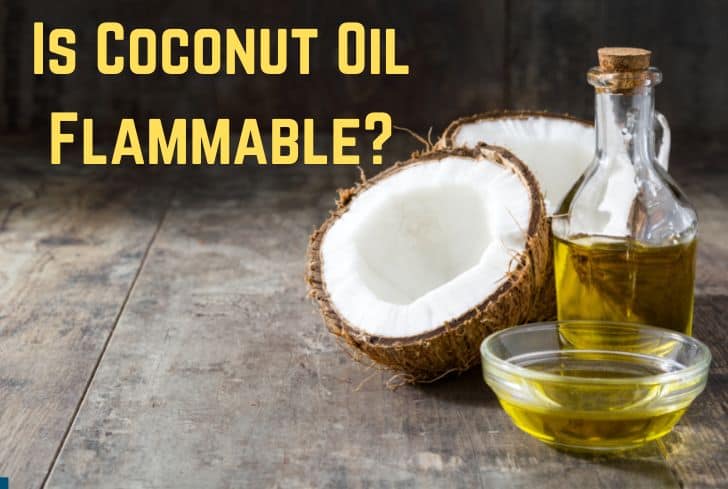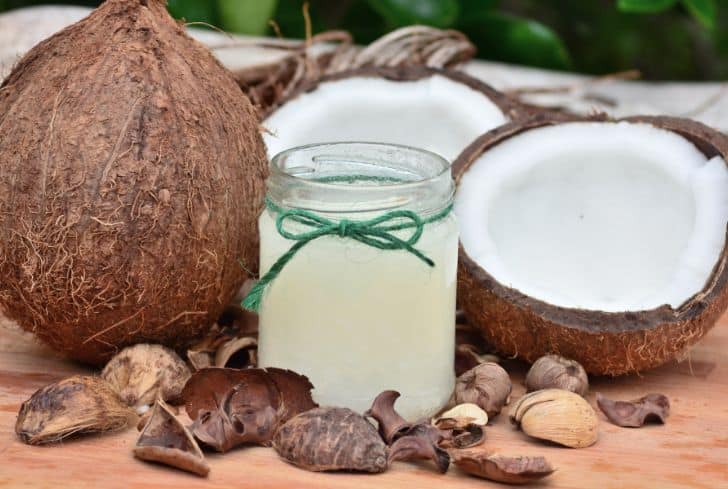Is Coconut Oil Flammable? (And Is It Toxic?)

People are becoming increasingly aware of the benefits of using coconut oil for cooking and skincare. However, unlike the other essential oils, coconut oil has some unique qualities that necessitate handling it with additional care. You should use greater caution when using it near a fire or any heat source. Is coconut oil flammable? It should be the first thing you question.
You can handle coconut oil more effectively if you have a basic understanding of it. This article explains whether coconut oil burns or ignites when exposed to oxygen. It is equally crucial to understand the flash and smoke points to know which temperature threshold not to exceed. Finally, we discuss if coconut oil is toxic, whether you can use it in high temperatures, and whether it can start a fire. We shall offer tips on disposing of used or expired coconut oil.
Can You Burn Coconut Oil?
Yes, coconut oil is highly flammable. It stops glistering and begins to burn when it reaches the smoke point. The heat exposure at this point causes the oil’s compounds to break down. You need to take coconut oil’s smoke point into mind to prevent food from burning. You don’t want your meal to taste nasty or burned.
When burned, coconut oil loses many of its vital minerals and phytochemicals. If you eat meals with such oil, the oil also produces free radicals that are harmful to your health.
Coconut oil is the most flammable essential oil compared to other oils, such as olive oil. The majority of campers can start a fire with coconut oil. If you ignite coconut oil with a heat source, it will burn. Additionally, it will keep burning for a long time, making it an effective fuel source.
Is Coconut Oil Flammable With Oxygen?
If coconut oil is exposed to oxygen under intense pressure, it will ignite immediately. The amount of lauric acid in the oil is substantial. The coconut oil’s acids break down when heated, releasing VOCs (volatile compounds). Volatile chemical emissions are dangerous chemicals that can ignite a fire when exposed to oxygen. The oil is flammable due to the VOCs.
When coconut oil (fuel), oxygen (an oxidizer), and the right amount of heat are connected, you can quickly start a fire. The fire is typically fueled by oxygen.
Flashpoint of Coconut Oil
Coconut oil has a flash point of 563°F (295°C). Coconut oil needs to be heated above that point to burn. The lowest temperature at which oil can burn without igniting is known as the flash point. Whether coconut oil will catch fire when exposed to heat or flame depends on its flash point.
Smoke Point of Coconut Oil
The smoke point, also referred to as the burning point, is the temperature at which an oil or fat begins to produce a continuous bluish smoke that becomes clearly visible, dependent upon specific and defined conditions.
The smoke point of unrefined coconut oil is 350°F (177°C), while that of refined oil is 450°F (232°C). The oil’s smoke point is the lowest temperature you can heat the oil before it begins to smoke or burn. Oil begins to boil, smoke, and burn when heated and reaches 385°F. It will catch fire if you don’t remove it from the heat right away.
Because it still possesses enzymes, compounds, aromatic aromas, and minerals from the coconut, unrefined coconut oil has a lower smoke point. As a result, it has a higher content of nutrients and is more prone to rapid burning. Unrefined coconut oil is ideal when cooking at low temperatures because of its high compound content.
Because physical procedures extract most of the oil’s compounds, refined coconut oil has a higher smoke point. Some processes are boiling, bleaching, and filtering to extract the flavors and minerals in the coconut fully. These processes eliminate the compounds that don’t react well to heat, leaving cooking oils with a high concentration of neutral flavors and higher smoke points.

Is Coconut Oil Safe To Use at High Temperature?
Refined coconut oil is preferable to unrefined coconut oil when cooking meals at high temperatures. Because it has a higher smoke point than unrefined coconut oil, it is safer. You will likely use temperatures above 400°F when baking or frying meals. With a smoke point of 450°F, refined coconut oil can withstand high temperatures.
Because it has a 385°F smoke point, you should not use unrefined coconut at high temperatures. Due to the high temperatures needed for baking and frying, its smoke point prevents it from being suited for those two cooking methods.
Can You Start a Fire With Coconut Oil?
Yes, coconut oil is highly flammable and is an effective fire starter. As a result, it is not recommended to fry meals with coconut oil that has not been refined. Due to its low smoke point, coconut oil rapidly catches fire when placed near an open flame. Your food could quickly burn if you’re not careful.
However, you can use coconut oil to start a fire if you’re camping quickly. If you want to start a fire, you can follow these steps:
- Heat the coconut oil until it turns into liquid.
- Once the oil is liquid, add wood chunks or chips into the oil.
- Use a match or an open flame, such as a candle, to start the fire.
- Wait for the wood to ignite, which shouldn’t take long.
Is Coconut Oil Toxic?
It is difficult to classify coconut oil as toxic because it is said to have several health benefits. However, a safety data sheet for refined coconut oil states it is harmful. When the oil comes in contact with your skin, eyes, or other body parts, it irritates them. Ingestion will upset your stomach, and inhalation will make it difficult for you to breathe.
Another study has shown that coconut oil has 91.9% saturated fats. Healthwise, saturated fats are associated with bad cholesterol and heart disease.
Comparison of the fatty acid composition of selected edible oils and fats. SFA, saturated fatty acid; MUFA, monounsaturated fatty acid; PUFA, polyunsaturated fatty acid. Data source: McCance and Widdowson’s Composition of Foods (PHE 2015)
Isn’t it surprising to see that coconut oil appears to have more saturated fat than even butter? Use coconut oil in small amounts. Avoid substituting coconut oil for other common oils like olive and sunflower.
How To Dispose of Used or Expired Coconut Oil?
You might feel uncomfortable using your coconut oil to fry meals again after using it once. Additionally, coconut oil can expire or go bad. A yellowish color, a marbled or speckled appearance, or an “odd” odor will all be noticeable. Coconut oil will most likely spoil because of its unsaturated fat content.
You must properly dispose of coconut oil once it has gone bad or expired. It should be an eco-friendly, efficient, and safe method. Oil can harm the environment and the drainage system in your home. Therefore, you should never pour it down the drain.
Here are a few quick and easy methods for getting rid of used or expired coconut oil:
1. Pack properly and dispose of with other household waste
The oil shouldn’t be disposed of with other household trash. So that you can put it in a container, you should let it cool down. If you prefer working with a solid form, freeze it first. The container must be disposable and sealable, such as a plastic bottle or an empty milk carton. Avoid using plastic bags since they are too fragile and can start leaking. Once the containers are firmly sealed, you can discard them in the trash.
2. Take to a household hazardous waste disposal company
The oil that has gone bad or expired could be removed with the aid of several household hazardous waste disposal companies. You have the opportunity to get rid of the used or expired oil since the majority of them agree to do a door-to-door waste pickup.
3. Grease disposal system
The system for disposing of grease consists of a plastic container and foil-lined bags. The used or expired coconut oil can be poured into the bag and placed inside the container; you should ensure it is frozen. Once the bag is full, you can close it and dispose of it in the trash.
4. Non-toxic insecticide or weed killer
You can make a non-toxic insecticide using the oil because it is environmentally friendly. By coating the hazardous bugs’ bodies, the oil will suffocate them. The pores they need for breathing become blocked by the oil coating. Combine one spoonful of soap and one cup of used coconut oil in a spray bottle. Add a quart of water, then thoroughly combine.
You can use the mixture to spray weeds or bugs you want to get rid of.
5. Add to compost
Coconut oil is 100% vegetable oil. As a result, it is a natural food that you can add to your usual compost pile without risk. Avoid adding coconut oil to the compost, though, if you cooked meat in it or added animal fat. To prevent attracting some bugs, avoid using too much oil. The water/airflow could also be blocked by too much oil.
Conclusion
Even though coconut oil is growing in popularity, you need to learn how to use it safely to prevent accidents. Knowing coconut oil’s smoking and flash points will help you avoid heating it above those levels. At low temperatures, use unrefined coconut oil; at high temperatures, use refined coconut oil. Remember to use coconut oil cautiously despite the health benefits you have heard about.






